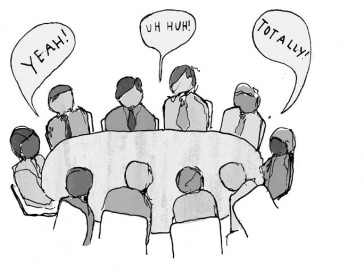
The report brings up nine key issues that cause problems to running live performance venues, which encompasses not just music, and makes 33 recommendations for changes. Here are some of the most important recommendations: to work towards developing flex use for spaces that are not typically venues, but may occasionally act as venues; changing the way bylaws are approached to create a focus on basic life safety instead of the overkill approach currently used to prevent all possible lawsuits that could be thrown at the city; retraining staff to work towards assisting people who want to run venues instead of acting as gatekeepers who prevent new venues from opening; and to simplify the current bylaws and make them easier to understand.
In an interview before the meeting, Vision Vancouver councillor Heather Deal made clear the goal of this report. “What we want is more performance venues,” she said.
“What you see here is a change in attitude,” Deal went on to say, explaining that city hall no longer wants to view cultural activities as an afterthought that cause administrative hassle, but rather to view things like concerts and performances as something that city hall would like to encourage more of.
The report was accepted by council with staff, council and all speakers in favour. City staff will not have much time to work on the changes until after the Olympics have finished rolling through town, but immediately after that they will begin working on making the short term goals a reality. Deal expects bylaw changes, which will have a serious effect on how things are run in town, to be presented to council in the first quarter of 2011.
The report acknowledges that current policy has had the effect of driving venue operators to simply run their spaces illegally and wants to change that.
“One thing I like about the report is that it says we’re driving things underground,” Deal admitted.
This problem was pointed out most strongly by Ryan McCormick of the Safe Amplification Site Society.
“How do we encourage creativity in Vancouver? We need to legalize it,” McCormick said before council. “I want to make it clear the underground spaces [referred to in the report] are actually illegal spaces.”
There is still a lot of work that needs to be done, and there is, of course, the problem of the province, who hold a lot of the strings for liquor regulation and have not yet been approached on this potentially thorny political issue.
“We need to engage the province in discussion,” said Will Johnston, the director of licenses and inspections and chief building official at city hall, when he brought up the issue of overlapping jurisdictions in regard to liquor.
Johnston gave some indication of the direction the city would take when lobbying the province though.
“Liquor primary and food primary, there’s nothing [permanent] in the middle,” he said, referring to the fact that there are only two types of liquor licenses an operator can acquire to sell booze. The liquor primary license is suitable for a bar or club and allows operators to make the majority of their money on alcohol sales, however these licenses are very difficult to get approved. The food primary license is suitable for a restaurant and allows for liquor sales, but the majority of the space’s profits must come from food sales. The majority of venues operate with one of these types of licenses, but places with food primaries, like Hoko’s for instance, can run afoul of regulators when they have events like concerts, which tend to have more liquor sales. An operator can apply for a Special Occasion License (SOL) which allows them to sell liquor at a one-time event. There isn’t currently anything in between these types of licenses and that is likely what the city will push the province to create.
There is hope that these new recommendations will also bring down the cost of creating a new venue in town. “It is impossible to create an affordable music venue in Vancouver,” said Dave Duprey, when he spoke before council. To create a new venue in Vancouver from scratch is well beyond the ability of a small business.
Though the regulations that will actually change things are still a long way off, there’s a lot of hope that this first step will lead to a complete change in Vancouver’s music and cultural landscape.
“If Vancouver wants to be a world-class city then it really needs to embrace the [arts] community,” said Alison Thieriault, from Bible Belts, on the verge of tears as she spoke to council about how necessary these changes were. These changes won’t go through in time for the millions of Olympic guests to see, but if they do maybe, when they return Vancouver will be somewhere we can be proud to live.

